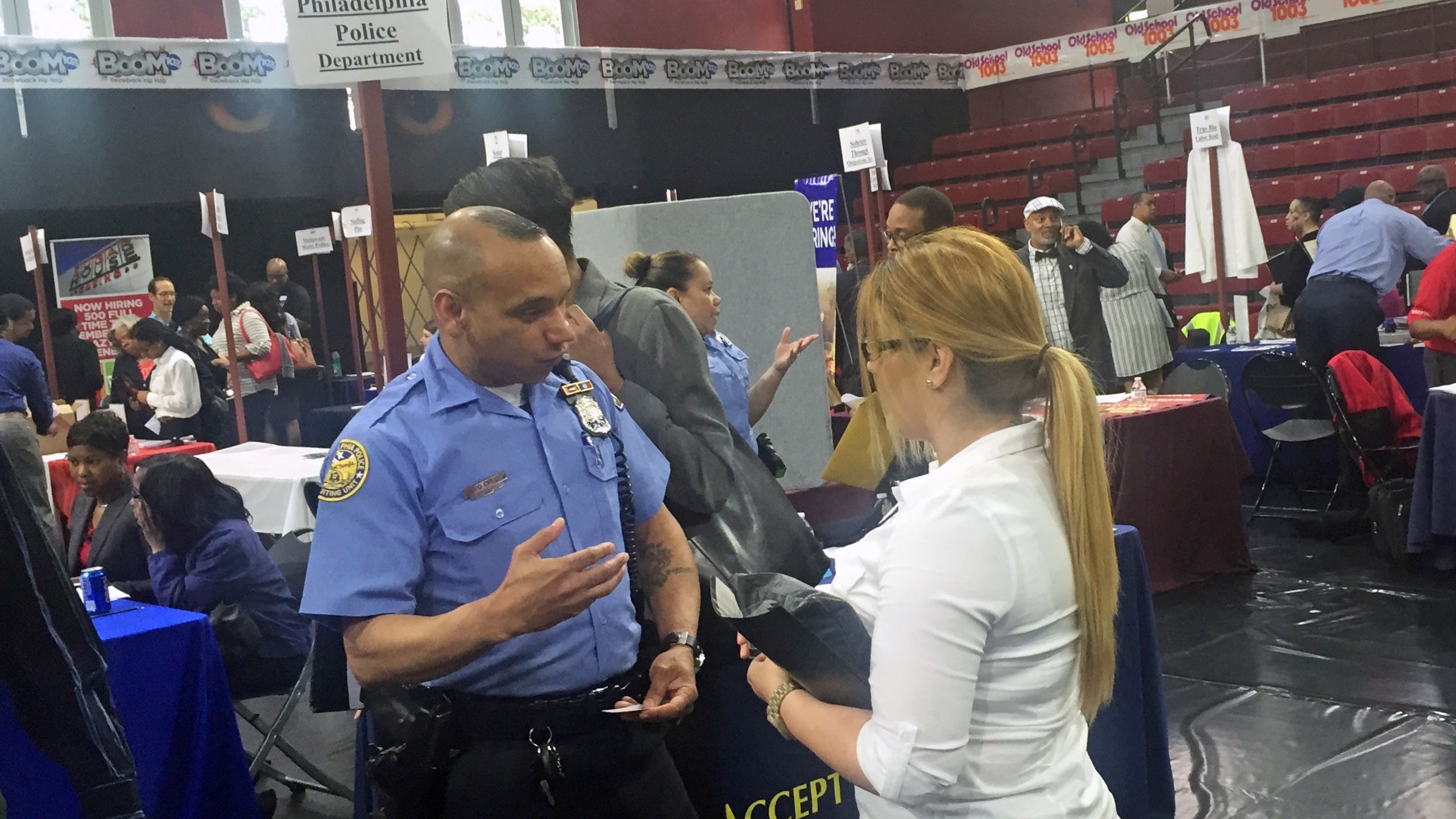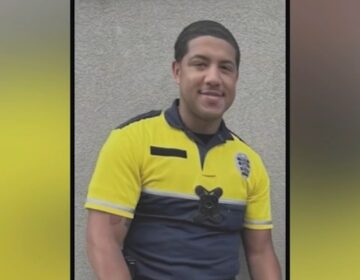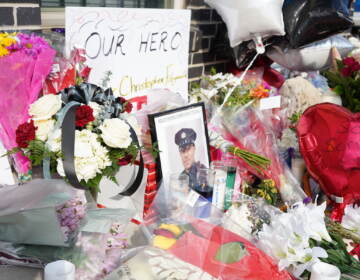As quest for new police recruits continues, Philly department scraps college-credit requirement

Officer Samuel Cruz with the Philadelphia Police Department's recruiting division chats with a would-be recruit at a job fair at Temple University.(Bobby Allyn/WHYY)
The Philadelphia Police Department has been ramping up recruitment efforts across job fairs, colleges and on social media, desperate to replenish its ranks as retirements outpace hiring.
Staffing has hit a 22-year-low. In response, the department recently loosened hiring requirements in hopes of closing the manpower shortage.
At a packed job fair at Temple University recently, Philadelphia Police Officer Samuel Cruz said word spread fast.
“The biggest question today was, ‘When are you guys getting rid of the college credits?'” said Cruz, a former patrol officer who now works in the department’s recruitment division.
The answer is that it has with the recent vote from the Civil Service Commission, which approved the change in April. The administrative board, which reviews civil services changes, ratified the move earlier this month. The department expects the college credit requirement to be officially eliminated starting in July.
The mandatory college credit policy was implemented by former Commissioner Charles Ramsey and is considered a best practice in many cities. But now, the department believes it may have had an unintended consequence — contributing to a staff shortage of 400 officer positions.
In response, Police Commissioner Richard Ross recently told City Council that nixing the policy might just boost applications. Once staffing is back on track, Ross noted, he could push to reinstate it.
“Look, I have my reservations on going backwards on the education requirement, I’ll be honest with you,” Ross said in April. “But my first concern is the safety of the people who live and visit and work in this city.”
And until the department can reach its full staffing level of 6,500 officers, more and more districts are going to feel stretched thin, some working longer hours to mask the shortage.
Overtime and stress
“Police are working a lot more overtime and being tired. When officers are tired, it sounds like common sense, right, they have a harder time doing their jobs. We all our stressed out, we all make more mistakes when we’ve been working too long,” said Emily Owens, a criminology professor at the University of Pennsylvania.
So far this year, the department has spent $68 million on overtime, exceeding its overtime budget by nearly $20 million. Ross told City Council at a recent budget hearing that beefed-up staffing last fall for Pope Francis’ visit was a major contributing factor, but the staffing shortage is not helping ease the overtime stress.
Owens said it’s especially hard maintain stable staff levels with such a large department. Most major cities have about two officers per thousand people while Philadelphia has four officers per thousand. That said, New York City and Chicago have about the same number of police as Philadelphia per capita. By contrast, Washington, D.C., leads the country with about six officers per thousand, federal statistics show.
Still, Owens said, lowering standards could be risky. She suggested a better incentive would be to offer more money. Right now, the starting salary for a police officer is about $48,000 a year. After graduating from the academy, it jumps to $51,000.
“Philadelphia pays sort of on par with most other large agencies. They could pay more and not be sort of out of the scope of what we think is normal,” Owens said. “And I would say that would get more people from all neighborhoods and all backgrounds to apply for your jobs.”
About a third of big city police departments require two years of college, federal figures show. And there’s debate about whether college credits can really make a cop better at policing. Critics say you don’t learn street smarts by sitting in a seminar; others argue that more critical thinking skills can only help police.
That’s been the position of Peirce College, which offers a two-year criminal justice degree popular with people hoping to pursue careers in law enforcement.
While you might expect dopping the college requirement would hurt enrollment at Peirce, legal studies faculty chairman Ed Miller said that is not what he sees on the horizon. Because the department is also raising the minimum age for joining, he thinks many candidates will pursue a degree, maybe even Peirce’s four-year option.
“Having the opportunity of the lifelong learning skills, and the community awareness that comes through your experience in college,” Miller said. “I think that brings a stronger candidate to the process.”
Changing perceptions
Back at the recruitment table at the college fair, Officer Cruz told Tomas McWaters about a hiring change in lieu of the college credits — the minimum age will jump from 19 to 22.
McWaters served six months of active duty in the Army, which is now enough to enter the police academy. Another way to get around the college requirement is to complete the Philadelphia Police Explorers Cadet Program, or have served for a year in law enforcement elsewhere.
Officials think raising the age bar three years will bring in more mature applicants. After chatting with Cruz, McWaters said that whether a teenager or 20-something, most of his friends in West Philly would never think of becoming a cop.
“Because people look at you like you’re a rat or something. So, I mean, I don’t know, that’s just how the neighborhood is. I can’t change it within a day,” he said.
But he said he’s willing to put aside the neighborhood’s attitude and prove that the police officers you want in your community are the people from your community.
It’s a message the department has been pushing, too. But, as Owens noted, viral social media accounts of the police shootings of unarmed black men around the country have cast a pall on perceptions in some neighborhoods.
“A small number of bad officers having bad days that are caught on tape are viewed much more widely than they were three years ago, right, and that gives all officers a bad rap,” Owens said.
Antonio James of North Philly who’s considering becoming a police officer, said that’s definitely true is his community.
“I know some of my friends don’t wanna become a cop, because what they say about us. Or it’s not cool to be a cop because of what they do. I see different black American people getting frisked every day, and being treated like they’re nothing.”
But James, like McWaters, said he thinks the best way to change that is from within.
“Police officers deserve a chance to prove themselves,” said 17-year-old James. “I want to prove that I could be a good cop and that people can trust us.”
This is an updated version of this story. It more clearly reflects Ed Miller’s views on the topic outside of his quotation.
WHYY is your source for fact-based, in-depth journalism and information. As a nonprofit organization, we rely on financial support from readers like you. Please give today.




